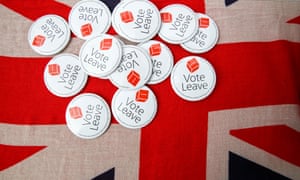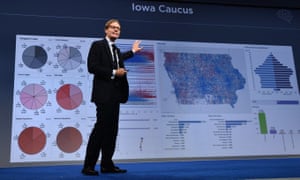Watchdog to launch probe into misuse of data in politics
Inquiry follows revelations of digital firm’s involvement in Brexit
 Information supplied by Cambridge Analytica was said to have been vital to the Leave campaign’s success in the EU referndum. Photograph: Bloomberg/Bloomberg via Getty Images
Information supplied by Cambridge Analytica was said to have been vital to the Leave campaign’s success in the EU referndum. Photograph: Bloomberg/Bloomberg via Getty ImagesThe UK’s privacy watchdog is launching an inquiry into how voters’ personal data is being captured and exploited in political campaigns, cited as a key factor in both the Brexit and Trump victories last year.
The intervention by the Information Commissioner’s Office (ICO) follows revelations in last week’s Observer that a technology company part-owned by a US billionaire played a key role in the campaign to persuade Britons to vote to leave the European Union.
It comes as privacy campaigners, lawyers, politicians and technology experts express fears that electoral laws are not keeping up with the pace of technological change.
“We are conducting a wide assessment of the data-protection risks arising from the use of data analytics, including for political purposes, and will be contacting a range of organisations,” an ICO spokeswoman confirmed. “We intend to publicise our findings later this year.”
The ICO spokeswoman confirmed that it had approached Cambridge Analytica over its apparent use of data following the story in the Observer. “We have concerns about Cambridge Analytica’s reported use of personal data and we are in contact with the organisation,” she said.
The company, which has offices in London, New York and Washington, uses data analysis to build up sophisticated profiles of individuals to predict how they might vote. Reportedly part-owned by US billionaire Robert Mercer, it claims to have played an influential role in the US election, using its data-crunching ability to identify key swing voters.
Mercer is a friend of former Ukip leader Nigel Farage. Last week, Andy Wigmore, the communications director of the pro-Brexit campaign group, Leave.EU, told the Observer they had been introduced to the company by the Mercer family.
“They were happy to help,” he said. “Because Nigel is a good friend of the Mercers. And Mercer introduced them to us. He said, ‘Here’s this company we think may be useful to you’. What they were trying to do in the US and what we were trying to do had massive parallels. We shared a lot of information.”
In February 2016, the company’s chief executive, Alexander Nix, talked about how it had helped to “supercharge Leave.EU’s social media campaign by ensuring the right messages are getting to the right voters online”.
A spokesman for Cambridge Analytica denied it had played any role – either paid or unpaid – during the referendum campaign, something that would have to be declared to the Electoral Commission. But Green MP Caroline Lucas, who campaigned for Remain, said: “Clearly, there are questions to be answered about the Leave campaign’s use of big data and a potentially huge ‘in kind’ donation by Cambridge Analytica. To have a foreign billionaire’s fingerprints left all over such a seismic moment in British history is deeply concerning and requires urgent further investigation as to whether electoral law was broken.”
A 2015 presentation by one of Cambridge Analytica’s analysts, until recently available on YouTube, explained how it had used “Facebook likes … as an input to machine-learning models.”
In the US, companies are free to use third-party data without seeking consent. But Gavin Millar QC, of Matrix Chambers, said this was not the case in Europe. “The position in law is exactly the same as when people would go canvassing from door to door,” Millar said. “They have to say who they are, and if you don’t want to talk to them you can shut the door in their face.That’s the same principle behind the data protection act. It’s why if telephone canvassers ring you, they have to say that whole long speech. You have to identify yourself explicitly.”
The Cambridge Analytica spokesman said: “We do not use data from Facebook. We do not have access to Facebook likes … What you have sent us relates to a research project done in 2015 with an intern data scientist using an anonymous data set. The goal was to reproduce findings in the peer-reviewed literature … Its application for us is limited by the fact that we don’t have Facebook likes covering the population (only Facebook has those data).”
A Facebook spokesperson said: “Our investigation to date has not uncovered anything that suggests wrongdoing with respect to Cambridge Analytica’s work on the Leave and Trump campaigns.”
Photograph: Sergei Konkov/TASS
The spokesman for Cambridge Analytica said: “We are in touch with the ICO, and are happy to demonstrate that we are completely compliant with UK and EU data law.”
A second specialist profiling company is also under scrutiny for its work in the Brexit campaign. Canadian firm AggregateIQ uses targeted marketing such as online advertising and social media to ensure that its clients’ content reaches the right people.
BuzzFeed News recently revealed how Vote Leave gave £625,000 to a student, Darren Grimes, which he then used to hire AggregateIQ to produce a targeted pro-leave Facebook ad campaign - apparently with spectacular results. Dominic Cummings, the campaign director of Vote Leave, declared: “Without a doubt, the Vote Leave campaign owes a great deal of its success to the work of AggregateIQ. We couldn’t have done it without them.”
Dr Simon Moores, visiting lecturer in the applied sciences and computing department at Canterbury Christ Church University and a technology ambassador under the Blair government, said the ICO’s decision to shine a light on the use of big data in politics was timely.
“A rapid convergence in the data mining, algorithmic and granular analytics capabilities of companies like Cambridge Analytica and Facebook is creating powerful, unregulated and opaque ‘intelligence platforms’. In turn, these can have enormous influence to affect what we learn, how we feel, and how we vote. The algorithms they may produce are frequently hidden from scrutiny and we see only the results of any insights they might choose to publish.”


Geen opmerkingen:
Een reactie posten
Opmerking: Alleen leden van deze blog kunnen een reactie posten.